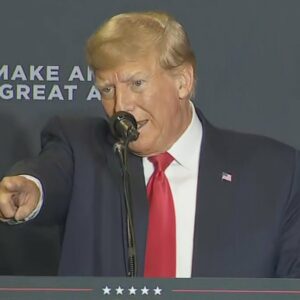New Hampshire Republicans say they like former President Donald Trump, they don’t like federal regulations, and they are very concerned about the explosion in the nation’s debt. Those are the findings of a new poll released by the Competitiveness Coalition in coordination with The Josiah Bartlett Center for Public Policy (JBC).
The poll of 800 Granite State Republicans found 47 percent support Trump for the 2024 GOP presidential nomination, with Gov. Ron DeSantis and former Gov. Nikki Haley tied for second at 10 percent each. Also tied: former Gov. Chris Christie and businessman Vivek Ramaswamy at eight percent. No other candidates broke the five percent mark.
Trump’s 30-point lead over the rest of the field is consistent with national polls and polling in other early primary states.
And while there is little discussion of federal debt and deficits on the campaign trail, when asked what issue would be the most important in deciding how to vote in the primary, the top answer was “reducing federal deficits and cutting wasteful spending.” Also important: repealing parts of President Joe Biden’s Inflation Reduction Act (21 percent), deploying the military to the Mexican border (19 percent), and keeping taxes low (18 percent).
The poll also found New Hampshire Republicans have not embraced some of the big government policies advocated by what is sometimes called the “New Right.” For example, 72 percent said there is already too much regulation of American businesses, and a similar number oppose Biden administration regulations that would break up large technology companies such as Amazon, Apple, and Google.
“It’s clear that Republican voters in the ‘First In The Nation’ state oppose the misguided Biden antitrust agenda and believe it will exacerbate the challenges of Bidenomics,” said former U.S. Sen. Scott Brown, chair of the Competitiveness Coalition. “The candidates competing in the Granite State would be wise to take heed and advocate for policies that will bring economic relief rather than additional pain.”
The Republican Party, long an advocate of laissez-faire, free-market economics, is undergoing a shift. Political candidates like DeSantis and Ramaswamy are urging elected Republicans to use state power to fight large corporations and public institutions they believe are working against the values of their voters. DeSantis’ decision to confront Disney is a recent example. When the Florida-based company decided to intervene in the public policy debate over whether the state’s elementary school students should be using classroom content on topics like same-sex relationships and gender fluidity, DeSantis used his regulatory authority to push back.
A top target for populist Republicans like Sen. Josh Hawley (R-Mo.) is Big Tech. They want the federal government to use antitrust regulations to force some large tech businesses to break up. Opponents point out there is a robust free market in tech, with major players like Facebook fading as new competitors like TikTok take off. The recent purchase of the app formerly known as Twitter and the dramatic changes there, free-market advocates say, is an example of the dynamic marketplace meeting customer demand.
Based on the new poll, most Granite State Republicans agree. “The top concerns on changes technology companies could make if these regulations go into place are Google starting to charge for their services (34 percent), and Apple no longer being able to ensure the safety and security of downloaded apps (also 34 percent),” the Competitiveness Coalition reports.
“Generally speaking, Republican primary voters would prefer to see their candidates fight government than American corporations,” added JBC president Drew Cline.
On Wednesday, former Vice President Mike Pence is scheduled to deliver a speech at the New Hampshire Institute of Politics addressing some of these issues. Entitled “Populism vs. Conservatism: Republicans’ Time for Choosing,” Pence’s speech “will explore the threats of populism unmoored from conservative principles and define the choice ahead for both the Republican Party and the nation,” according to a statement from the campaign.
Then again, Pence only has the support of four percent of New Hampshire voters in the new poll.
Brown believes attacking the tech platforms American consumers use daily is a mistake for the GOP.
“We have far too much regulation on our innovators already, and breaking up successful American success stories to the benefit of the Chinese Communist Party is the exact wrong approach.”





